- Home
- Tracy Chevalier
Falling Angels Page 20
Falling Angels Read online
Page 20
The body just lays there. And I have to get it back somehow, from a mews off the Edgware Road to Dartmouth Park.
How am I going to get her all that way without someone seeing me? I wonder. Anyone sees me will think I did it.
Then I look up at the end of the mews and see a man standing there. A tall man. Can’t see much of his face ‘cept the glint of his specs in the streetlamp and a thin moustache. He’s staring at me, and when he sees me looking at him he steps back behind the building.
Could be he thinks I’ve done it and he’s off to tell someone. But I know he’s not. It’s him what done it. Our pa says men can’t leave their crimes alone—they got to come sniffing round again, like worrying a loose tooth or picking a scab.
I run out the mews to look for him, but he’s gone. I know he’ll come back again, though, and if I don’t take her now he will.
I straighten out her dress a bit, and her hair, and I buckle on one of her shoes what’d come off. When I lift her onto my back I see her straw hat’s been under her. It’s all broken, and the flowers crushed, and too much trouble to pick it up with Ivy May heavy on my back, so I leave it on the ground.
If anyone asks, I’ll say she’s my sister and fallen asleep. But I stay away from the pubs and keep to the little streets and then the parks, Regents then Primmers Hill then the bottom of the heath, and I don’t see many folk. And none ask. That time of night the people out are too drunk to notice, or else up to their own mischief and don’t want to draw attention to themselves.
All the way home I keep thinking ‘bout that hat. I wish I hadn’t left it. I don’t like leaving any part of her there. So when it’s over, when I’ve got her home, I go back, all the way through the parks and the streets. It takes no time, not without her weight on my back. But when I get to the mews and look behind the bricks the hat is already gone, flowers and all.
Maude Coleman
I waited on the wrought-iron steps that led from the French doors down into the garden. The air smelled of jasmine and mint and grass sprinkled with dew. I could hear frogs croaking in the pond at the bottom of the garden and, from the window below me, Jenny sobbing in the kitchen.
I have never been good at waiting—it always seems so wasteful, and I feel guilty, as if I should be doing something else. But I could not do anything else now—there was nothing to be done. Grandmother had arrived and was sitting in the morning room, knitting furiously, but I did not want to be busy like that. Instead I looked up at the stars, picking out the constellations—the Great Bear, the Crow, the Wolf.
The church bells close by struck midnight.
Daddy came and stood in the open French doors and lit a cigarette. I did not look at him.
“It’s a clear night,” he said.
“Yes.”
“Pity we can’t set up the telescope in the garden—we might even see Jupiter’s moons. But of course it wouldn’t be right, would it?”
I did not answer, though I’d had the same thought myself.
“I’m sorry I shouted at you when you arrived home, Maude. I was upset.”
“That’s all right.”
“I was afraid I’d lost you too.”
I shifted on the cold metal. “Don’t say that, Daddy.”
He coughed. “No, you’re right.”
Then we heard the scream, long and high pitched, from the direction of the Waterhouses’ house. I shivered.
“What in God’s name was that?” Daddy asked.
I shook my head. I had not told him about Ivy May going missing.
A throat cleared behind us. The doctor had come downstairs to get us. Now that the waiting was over I did not want to move from the steps. I did not want to see my mother. I had been waiting for her all my life, and now I preferred to be waiting for her always, if that was the only alternative.
Daddy flicked his cigarette into the garden and turned to follow the doctor. I could hear it sizzling in the dewy grass. After it stopped I went inside too.
Mummy was lying very still, her face pale, her eyes open and unnaturally bright. I sat down next to her. She fixed her eyes on me. I knew she was waiting for me to speak.
I had no idea what to say or do. Lavinia and I had rehearsed such scenes many times when we were playacting, but none of that seemed right now that I was actually here with Mummy. It felt silly to say something melodramatic, ridiculous to say something banal.
In the end, though, I did resort to the banal. “The garden smells nice tonight. The jasmine especially.”
Mummy nodded. “I’ve always loved jasmine on a summer’s night,” she said. Then she closed her eyes.
Was that all we were going to talk about—jasmine? It seemed so. I squeezed her hand tightly and looked hard at her face, as if that would help me to remember it better. I could not bring myself to say good-bye.
The doctor touched my shoulder. “It’s best if you go now, miss.”
I let go of Mummy’s hand, and went downstairs and back out into the garden, wading through the wet grass down to the back fence. The ladder was still there, although Lavinia and I did not meet each other over the fence so much now. I climbed to the top of the wall. The Waterhouses’ ladder was not up. I balanced there for a moment, then jumped, landing in the wet grass and smearing my dress. When I got my breath back I walked up the garden to the French doors that led directly into the Waterhouses’ back parlor.
The family was arranged in a semicircular tableau that a painter might have set up. Ivy May lay across the chaise longue, hair spread around her face, eyes closed. Lavinia lay at her sister’s feet, her head resting on the edge of the chaise longue. Mrs. Waterhouse sat in an armchair near Ivy May’s head, holding her hand. Mr. Waterhouse leaned against the mantelpiece, a hand covering his eyes. Simon hovered near the door with his head bowed.
I knew just from looking at them, gathered together yet so separate in their grief, that Ivy May was dead.
I felt as if my heart had been hollowed out, and now my stomach was too.
When I came in they all looked at me. Lavinia jumped up and threw herself into my arms, weeping. I gazed over her shoulder at Mrs. Waterhouse. It was as if I were seeing myself mirrored in her face. Her eyes were quite dry, and her expression was of someone who has been struck a blow from which she will not recover.
Because of that, I spoke the words directly to her. “My mother is dead.”
Kitty Coleman
All her life Maude was a presence at my side, whether she was actually there or not. I pushed her away, yet she remained.
Now I was holding on to her hand and did not want to let go. It was she who had to let go of me. When she did at the last, I knew I was alone, and that it was time for me to depart.
Simon Field
Next day Mr. Jackson went out and shot that white horse through the head.
Later, as our pa and Joe and me was digging, the police came to take me away for questioning. Our pa didn’t even look surprised. He just shook his head and I knew what he were thinking—I should never have got in with them girls.
The police asked me all kinds of things about what I did that day—not just about looking for Ivy May, or finding her, but about the horse and Kitty Coleman and Mr. Jackson. They seemed way off the mark to me, and none too nice about it neither. It were like they wanted to make their lives easy and say I did the crime.
When it sounded like they was ready to accuse me I said, “Who would be stupid enough to do that to a girl and then bring her home to her parents?”
“You would be surprised what criminals do,” one of the policemen said.
I thought of the tall man with the specs at the end of the mews. But when it came time to describe finding Ivy May I didn’t tell ‘em about him. Would’ve been easier on me if I had—given ’em someone else to look for.
But I knew he was long gone—them bumblers would never find him.
I would, though, someday. Find him. For Ivy May.
John Jackson
I arr
anged to meet Miss Coleman at her family grave. I’d considered asking her to come to Faraday, where her mother and I used to meet. But it was a silly, sentimental thought, and risky besides—questions might be asked if we were seen alone in the Dissenters, whereas in the meadow we could be thought to be discussing burial arrangements.
She was dressed all in black, with her hair up under a black straw hat. I had never seen her before with her hair up—she looked several years older. She has no idea but she is beginning to resemble Kitty.
“Thank you for coming, Miss Coleman,” I said as we stood side by side next to the grave. “I’m so sorry for your loss. It has been a great shock to us all. But your mother is with God now.” I blinked rapidly at the ground. I often express my condolences to mourners at the cemetery, but this time I felt the inadequacy of the words.
“My mother did not believe in heaven,” Maude said. “You know that.”
I wondered what those last three words were meant to signal. How much did she know about my intimacy with her mother? Her expression was so guarded that it was impossible to guess.
“Simon didn’t tell me what you wanted to see me about when he delivered the message,” she said. “I assume it is to do with my mother’s burial, which I thought my father went over with you.”
“He was here yesterday, yes. There was something I wished to discuss with him but did not. I thought that perhaps you and I might do so.”
Maude raised her eyebrows but said nothing.
There was no easy way to say it—no stock expressions or careful euphemisms to smooth the shock of the idea. “Your mother told me she wished to be cremated rather than interred.”
Maude looked up at the Coleman urn, studying it as if she had never seen it before. “I know that. She was always worried she might be buried alive.”
“Then perhaps you could tell your father what she told you.”
“Why didn’t you tell him yesterday?”
I paused. “She spoke of it only unofficially—she did not put it in writing or tell her husband. It would not be appropriate for me to tell him.”
Maude pursed her lips. “Daddy already knows she wanted to be cremated. They used to argue about it. He feels we should do what society dictates concerning the disposal of—of bodies.”
“He won’t agree to it even if he knows it was his wife’s fervent wish?”
“He’ll do what looks best.” Maude paused. “He lost her, and now he has got her back he will be sure to keep her.”
“What people do with their dead is usually a reflection of themselves rather than of their loved one,” I said. “Do you think all these urns and angels mean anything to the dead? It takes a very unselfish man to do exactly what his wife wants without his own—or society’s —desires and tastes entering into it. I had rather hoped your father was that man.”
“But surely if all these monuments mean nothing to the dead, then nothing we do to them does?” Maude replied. “If they don’t care, shouldn’t we then do what is important to us? It’s we who are left behind, after all. I’ve often thought this place is really for the living, not the dead. We design the grave to remind us of the dead, and of what we remember of them.”
“Will the urn on your family grave remind you of your mother—of what she was and what she wanted?”
“No, there is nothing of my mother on it,” Maude admitted. “If my mother were to choose her own grave it would have a statue of Mrs. Pankhurst on it and under her name it would read ‘Votes for Women.’ ”
I shook my head. “If your mother were to choose her own grave there would be no monument or words at all. It would be a bed of wildflowers.”
Maude frowned. “But Mummy is dead, isn’t she? She really is dead. She’s not going to design her grave.”
She was a remarkable young lady—there are few who could say what she said without flinching.
“And because she’s dead,” she continued, “surely she won’t care what happens to her body. She won’t be buried alive—we know that. It’s we who care—my father most of all. He represents all of us, and he must decide what is best.”
I leaned over and brushed away a spider from the Waterhouse grave. I knew it was not fair of me to make demands on her—after all, she was only thirteen years old and had just lost her mother. But for Kitty’s sake I must. “All I would ask of you, Miss Coleman,” I said gently, “is that you remind your father of what you know—of what he must already know—of your mother’s wishes. It is of course for him to decide what will then be done.”
Maude nodded and turned to go.
“Maude,” I said.
“Yes?”
“There is something else.”
She closed her eyes briefly, then looked at me.
“Your mother’s funeral”—I stopped abruptly. I could not tell her—it would be a breach of my professional duties, and I could lose my position for saying anything. But I wanted somehow to warn her. “It would be best if you spoke to your father sooner rather than later.”
“All right.”
“It is a matter of urgency. Perhaps more than you know.”
“I’ll speak to him today.” Maude turned and hurried down the path that led to the entrance.
I stood there for some time, studying the Coleman grave. It was hard to imagine Kitty being buried there. That absurd urn made me want to snort with laughter.
Richard Coleman
She came to see me in my study as I was going through papers. I stopped writing. “What is it, Maude?”
She took a deep breath—she was clearly very nervous. “Mummy said to me once that she wanted to be cremated and her ashes scattered.”
I looked down at my hands. There was a spot of ink on the cuff of my shirt. “Your mother said a great many things that have not come to pass. She once said she wanted four children. Do you see any sisters or brothers about? Sometimes what we think and what we do are not meant to be the same.”
“But—”
“That’s enough, Maude—there is nothing more to be said on the matter.”
Maude shuddered. I’d spoken more sharply than I’d intended. These days I find it difficult to control my tone.
“I’m sorry, Daddy,” she whispered. “I was only thinking of Mummy. I didn’t mean to upset you.”
“You haven’t upset me!” I pressed my pen so hard into the paper that the nib suddenly cracked. “Damn!” I threw down the pen.
Maude slipped out without another word.
The sooner this week is over the better.
Lavinia Waterhouse
Purchased from Jay’s in Regent Street, 22nd June 1908:1. 1 black dress in paramatta silk for me—for the funeral and for Sundays; my old merino dress is for everyday. There was an even lovelier silk dress, with crape all round the neck, but it was too dear.
2. 1 black bombazine dress for Mama. It looks so cheap and shiny that I tried to convince her to buy paramatta instead, but she said we didn’t have the money and she would rather I had the silk as it matters more to me. Sweet of her.
3. 1 black cotton petticoat for me, 2 pairs bloomers threaded with black ribbon.
4. 1 black felt hat with veil for me. I insisted on the veil—I look so awful when I’ve been crying and shall need to pull down the veil often to hide my red eyes and nose. Mama did not buy a hat for herself but said she would dye one of her bonnets. She did at least buy a few ostrich feathers to trim it with.
5. 2 pairs black cotton gloves for Mama and me. They have 4 lovely jet buttons up the cuff. Mama had chosen plain ones without buttons, but did not notice when I switched them. Also, pair of gloves, a hatband, and black cravat for Papa.
6. 7 black-edged handkerchiefs—2 for Mama, 5 for me. I wanted many more but Mama would not let me. She has not cried at all, but I insisted she should have a few, just in case she does cry.
7. 200 sheets stationery with medium-band black edging.
8. 100 remembrance cards on order that read as follows:
Ivy May Waterhouse Age 10
“A lovely flower, soon snatched away,
To bloom in realms divine;
Thousands will wish, at Judgment Day,
Their lives were short as mine.”
I chose the epitaph, as Mama was overcome in the shop and had to go outside for some air. The shop assistant said the epitaph was meant for a baby, not someone Ivy May’s age, but I think it’s lovely, especially the phrase To bloom in realms divine, and I insisted it remain.
I could have spent all day in Jay‘s—it is so comforting to be in a shop devoted entirely to what one is experiencing. But Mama refused to linger and became quite short with me. I don’t know what to do about her—she is very pale, poor dear, and hardly says a word except to be contrary. Much of the time she remains in her room, lying in bed as if she is ill. She rarely emerges for visitors, and so it has been up to me to see to the entertaining—pouring out cups of tea, asking Elizabeth to bring in more cake and crumpets. So many cousins arrived today that we ran out and I had to send Elizabeth to the baker’s for more. I myself cannot eat a thing, except for the odd slice of currant bread, which the King’s physician recommends for keeping the strength up.
I have tried to interest Mama in the letters of condolence we have received, but she does not seem to read them. I have had to answer them myself, as I worry that if I leave them with Mama she will simply forget, and it does not do to delay a reply.
People have said the most surprising things about Ivy May—how angelic she was, how she was the perfect daughter and such a support to Mama, how tragic for us and how much she will be missed. Indeed, I sometimes want to write back and ask if they thought it was I who died. But instead I make sure simply to sign my name large and clear, so that there will be no doubt.
Mama said to me at breakfast that she does not want me to go back to school, that I can finish the term by studying at home. Oust as well, as I am in no mood to sit in class. I should probably interrupt everything by weeping at the wrong moments.) And that next term I am to switch schools and attend the Sainte Union on the Highgate Road. My heart did a little leap, as the girls there have such smart uniforms. I was surprised, of course, as the school is Catholic, but perhaps I shouldn’t be—Mama asked for the priest from St. Joseph’s in Highgate to come and see her last night. Papa said not a word. If reverting to Catholicism is a comfort to her, what is one to say?

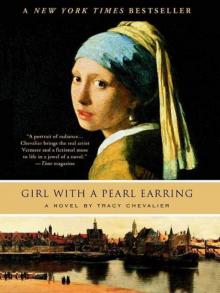 Girl With a Pearl Earring
Girl With a Pearl Earring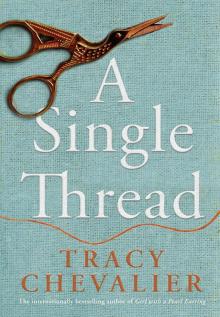 A Single Thread
A Single Thread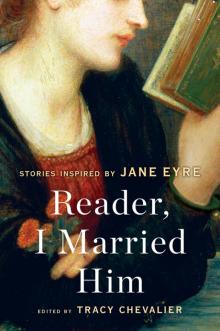 Reader, I Married Him: Stories Inspired by Jane Eyre
Reader, I Married Him: Stories Inspired by Jane Eyre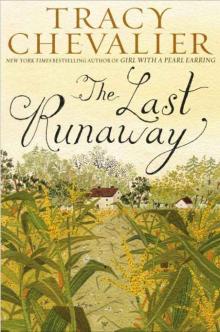 The Last Runaway
The Last Runaway Burning Bright
Burning Bright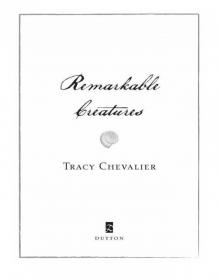 Remarkable Creatures
Remarkable Creatures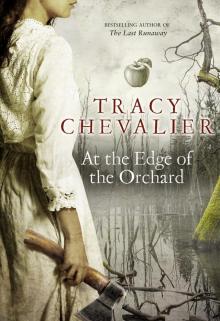 At the Edge of the Orchard
At the Edge of the Orchard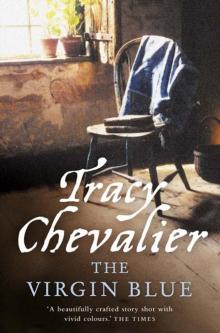 The Virgin Blue
The Virgin Blue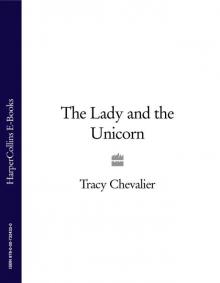 The Lady and the Unicorn
The Lady and the Unicorn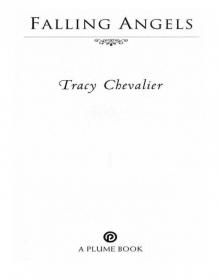 Falling Angels
Falling Angels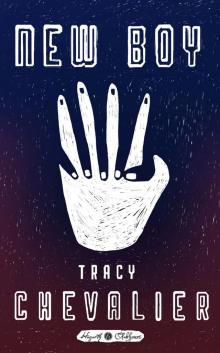 New Boy
New Boy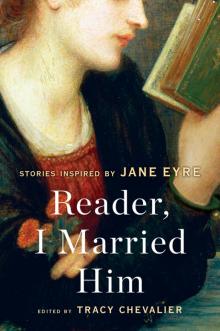 Reader, I Married Him
Reader, I Married Him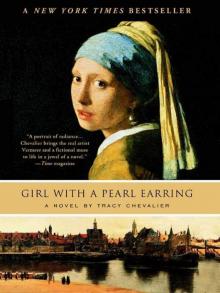 Girl with a Pearl Earring, The
Girl with a Pearl Earring, The